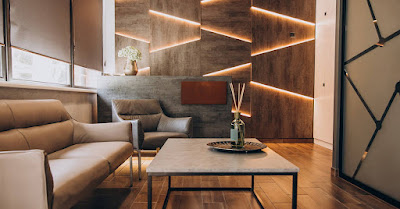Eco-Design Revolution with ACP False Ceilings
The world of architecture and design is ever-evolving, and sustainability has become more than just a trend—it's a necessity. The cladding industry has witnessed a significant shift towards eco-friendly materials, and Aluminium Composite Panel (ACP) has emerged as a frontrunner in sustainable design solutions. One area where ACP is making a notable impact is in false ceiling designs. So, when we speak about ACP sheet false ceiling, it is more about getting into the world of sustainable and Eco-friendly designs. With Aludecor, the ACP false ceiling designs, allow the architects, design consultants, real estate owners to explore the various use of environmentally conscious cladding materials and their integration into green building practices.
Why Sustainability is Popular in the Cladding Industry:
Diving into the realm of sustainable cladding, it's no surprise that recycling takes center stage. The environmental cost of extracting and manufacturing new materials pales in comparison to the energy savings achieved through recycling. Among the most recyclable materials globally, aluminium emerges as a frontrunner for sustainable cladding, boasting lossless recycling and unlimited reusability. While estimates claim that 75% of aluminium is recycled, the imperative lies in capitalizing on these benefits. This discussion shifts toward products like Aluminium Composite Material, demonstrating that sustainable cladding doesn't just recycle materials but transforms them into enduring, aesthetically pleasing facades like acp sheet ceiling design. The long lifespan of these cladding products, coupled with their minimal environmental impact during recycling, underscores the notion that the truly sustainable solution is one built to last.
Also Read : Fire Retardant Material : Unraveling the Power of ACP Sheets
What makes ACP sheet false ceiling such a premium choice -
- Environmental Consciousness: Growing awareness about climate change and environmental degradation.
- Resource Conservation: The need to conserve natural resources and reduce the carbon footprint.
- Regulatory Compliance: Stringent environmental regulations encouraging sustainable practices.
- Consumer Preferences: Increased demand for products aligning with ethical and eco-friendly values.
Importance of ACP false ceiling designs in Architectural Solutions:
- Aesthetic Enhancement: Innovative false ceiling ideas add depth and character to interior spaces.
- Acoustic Control: ACP partition sheet improves sound insulation and minimizes noise.
- Temperature Regulation: Acts as a thermal insulator, optimizing energy efficiency.
- Concealed Services: Hides unsightly fixtures, wiring, and ducts, providing a clean look.
ACP sheet false ceiling designs that align with Green Building Practices:
- Natural Elements Integration: ACP false ceilings can mimic the appearance of natural materials, reducing the need for resource-intensive alternatives.
- Energy-Efficient Lighting: Incorporating LED lights into false ceiling designs enhances energy efficiency, aligning with green building principles.
- Modular and Recyclable Components: ACP sheet false ceiling designed with modular components are easily recyclable, reducing waste.
Benefits of Sustainable ACP False Ceilings:
- Energy Efficiency: ACP sheet false ceiling can enhance natural light, reducing the need for artificial lighting.
- Recyclability: ACP false ceiling designs are fully recyclable, contributing to a circular economy and minimizing environmental impact.
- Low Maintenance: ACP false ceilings are easy to clean and maintain, promoting long-term durability.
- Temperature Regulation: Reflective properties aid in temperature control, reducing reliance on heating and cooling systems.
Design Principles for Sustainability:
- Biophilic Design: Incorporating elements of nature to enhance well-being.
- Energy Efficiency: Designing with an emphasis on reducing energy consumption.
- Space Optimization: Creating versatile spaces with minimal environmental impact.
Highlighting real-world applications of ACP false ceilings in sustainable projects showcases the material's effectiveness in various architectural settings. False ceiling design of ACP generally includes eco-friendly offices, green residential spaces, or sustainable community buildings.
ACP false ceilings serve as an integral component of green building practices, seamlessly aligning with sustainability goals in several keyways. First and foremost, they enhance energy efficiency by incorporating reflective surfaces that optimize natural light and reduce the need for artificial lighting. Moreover, these ceilings prioritize environmental responsibility by utilizing materials that are both recycled and recyclable, minimizing the ecological footprint associated with their production and disposal. Additionally, ACP false ceilings contribute to indoor environmental quality by emitting low levels of volatile organic compounds (VOCs), fostering a healthier and more sustainable indoor atmosphere. In essence, the integration of ACP false ceilings is a strategic choice for those committed to incorporating eco-friendly solutions into their construction practices.
As the world embraces a more environmentally conscious approach, the cladding industry, with ACP at its forefront, is not only meeting current needs but also contributing to a greener and more sustainable future.




Comments
Post a Comment